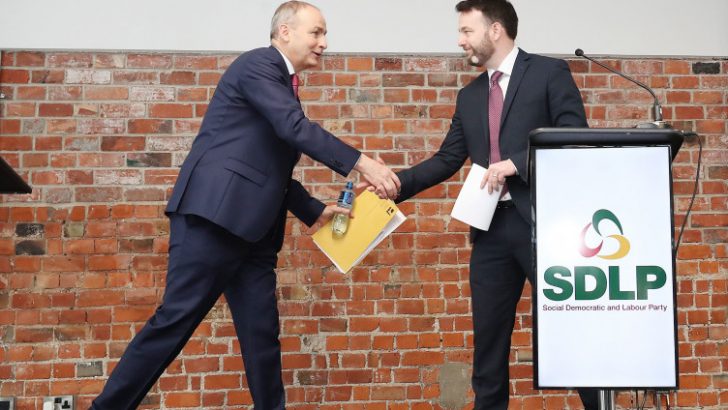The View
Pól Ó Muirí
In the trench warfare that passes for Northern politics, the news that Fianna Fáil and the SDLP were talking of getting spliced caused some interest. Some change, any change, is enough to get people talking. Then it emerged that, no, the parties were not going to marry; they were going to go for a sort of civil partnership in which they would swap policy ideas and, who knows, recipes too.
It is testament to how far both parties have fallen that no one was really interested one way or another. Fianna Fáil leader, Micheál Martin, more and more resembles a teacher without a lesson plan while the SDLP’s head yin, Colum Eastwood, is a serious and earnest man but, oddly for someone from Derry, lacking in charisma. Arise and follow Micheál and Colum? Thanks but no, go raibh maith agat.
Fianna Fáil and the SDLP have managed to saddle themselves with the worst of both worlds. Northern nationalists do not have much interest in southern politicians in general. Disdain is the default mode. That disdain is manifest in the Mass-going Catholics who have traditionally been the bulk of the SDLP’s voters.
Support
Many might sulk silently about the SDLP’s support for same-sex marriage – and be sensible enough to say nothing in public – but they will not sulk silently over Micheál Martin’s support for abortion and the SDLP’s new position on the issue. The SDLP says it is pro-life but will allow members a conscience vote on the issue of abortion. It was a policy change that caused one past leader, Alasdair McDonnell, to note: “I’m a little confused. I mean the SDLP has been and still is a pro-life party. But we’re opening up that we’re pro-life but that you can do your own thing.”
Essentially then long-suffering SDLP voters have to deal with a party that is going soft on one core plank of its politics while being tied into another party that has already reneged on its pro-life commitments. That will not excite many SDLP voters or, one imagines, many in Fianna Fáil either who will not want to hear the ‘a’ word spoken ever again.
Indeed, what is really in it for Fianna Fáil, a sort-of link up with Northerners but not too much of a link up because those Nordies are real trouble and backward on so many issues?
Unquestionably, a few years ago, many SDLP voters would have happily given their vote to Fianna Fáil, if only to spite Sinn Féin. But now, now, there is sourness in the soul, now the whole thing stinks of another shower of Free State wasters looking out for themselves and with no genuine interest in the plight of Northern nationalists.
There is an apt saying in Irish that might describe Northern nationalist mentality: ‘is fearr uaigneas ná droch-chuideachta’/ ‘better loneliness than bad company’.
The SDLP is a hard thing to describe. Technically, it is a political party like every other political party. You can join it. In reality, though, it was more a moral choice, a movement if you will. In that, it was oddly similar to Fianna Fáil which sees, or saw, itself as being more than simply a party; it was the soul of the Irish independence movement.
Without doubt, the SDLP provided a platform for some very astute and able politicians during the Troubles, politicians who countered violence and who worked towards a peaceful society. Their voters marched from Mass to the polling booths in huge numbers and cast their ballot with one simple aim: ‘Not in my name’.
The party did not kill people, blow them up, torture, maim or indulge in shoot-to-kill policies. Their voters were steadfast in rewarding candidates who most resembled themselves, who understood their woes and, yes, their anger, but they did not strike out. Better to endure than injure, might be an apt enough description.
Morality
That simple morality – ‘Thou shalt not kill’ – held sway over many of the party’s pre-Vatican II voters. It was a reason why many voted for it. Yes, a united Ireland would be a nice thing but not at the price being asked. The voters were as much Catholic Irish as they were Irish Catholics; Resurrection being more important than Insurrection.
The diminishing, but ever moral, voters that remain with the SDLP are casting their votes for a diminishing pool of local candidates. They cast them for people they know and like and once the candidates they know and like are no longer on the ballot paper they will, in all probability, not bother voting at all. They will go to Mass, say their prayers, go to the Novena, raise their children and local politics will be further impoverished by their loss come election time.
Is fearr uaigneas ná droch-chuideachta.


 Michéal Martin and Colum
Eastwood.
Michéal Martin and Colum
Eastwood. 